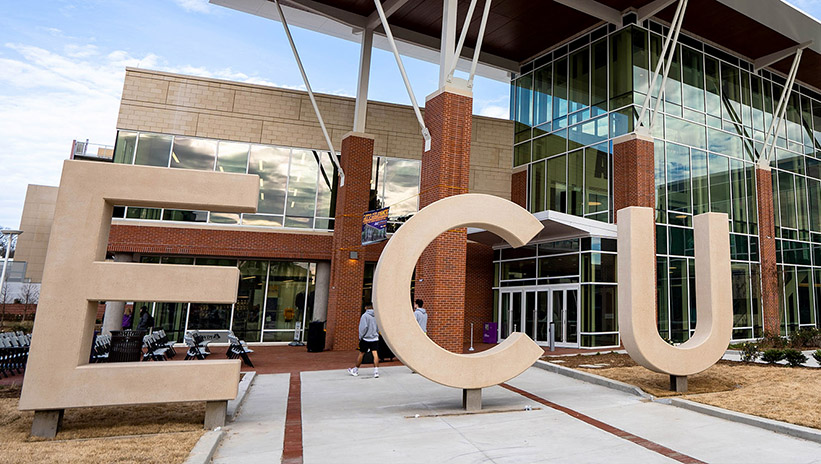Committed to the First Amendment and OUR Freedom of Speech since 2008
Economic Engine
Publisher's Note: This post appears here courtesy of ECU News Services. The author of this post is Matt Smith.

East Carolina University's annual economic impact across the state exceeds more than $2.5 billion, a 2019 study led by a team of Pirate researchers found.
In total, the university supports more than 27,000 jobs, with nearly 96% of those jobs concentrated in eastern North Carolina.
Conducted by ECU economic professors Meghan Millea and Haiyong Liu and former College of Business director of professional services and research James Kleckley, the study tracked the influence of university-related spending through university operations, student spending, visitor spending, capital expenditures and alumni dividend.
"Universities are economic engines. ECUís instruction prepares our graduates for careers, expands their minds through enriching programs, and improves their quality of life through its research and creative endeavors."
Overall, university operations spending accounted for 71.5% of the university's total economic impact. University operations spending includes funds for employee salaries and purchases of goods and services to maintain daily operations.
Student spending was second on the list, accounting for 14.6% of total impact, while capital expenditures and visitor spending accounted for 5% each.
"Universities are economic engines," Millea said. "ECU's instruction prepares our graduates for careers, expands their minds through enriching programs, and improves their quality of life through its research and creative endeavors. This study quantifies how ECU's spending on these transformative functions impacts the state and regional economies in terms of output, income and employment."
The university's research enterprise provided an $86 million economic output, according to the study, while supporting 912 jobs. ECU researchers have set new benchmarks in productivity over the last five years, reaching a record-high $74 million in sponsored program funding in fiscal year 2019.
Additionally, the university has increased its support of Pirate-backed small business ventures, ranging from medical imaging startup companies to student-led graphic arts companies. During the 2019 fiscal year, the university assisted 32 startup companies through the Small Business and Technology Development Center at ECU; supported 29 student-led microenterprises; and helped create or retain 336 small business jobs.
"ECU is often labeled as the engine of growth for the east. Thereís no mistaking the universityís direct and indirect impacts on the regional and state economy. We contribute to a talented workforce, we bring students and their expenditures from all across the state to Greenville, we engage in applied research to address important regional challenges, and ... we contribute to landscapes of innovation like Intersect East."
"ECU is often labeled as the engine of growth for the east," ECU Interim Chancellor Ron Mitchelson said. "There's no mistaking the university's direct and indirect impacts on the regional and state economy. We contribute to a talented workforce, we bring students and their expenditures from all across the state to Greenville, we engage in applied research to address important regional challenges, and, most recently, we contribute to landscapes of innovation like Intersect East. When we stay focused on the success of our students and the success of our region, we also maximize our impact. I am very proud of our mission and our economic contributions."
Overall, ECU's alumni base of 170,000 accounted for $75.5 million in spending across the state, including $6.3 million in eastern North Carolina.
Data for the report was gathered and analyzed before the coronavirus pandemic. Like many academic institutions across the country, ECU and its economic impact have been affected by the coronavirus.
The full report, along with the research team's methodology, is available online HERE.
Go Back

A study conducted by an East Carolina University research team found that the universityís economic impact totaled more than $2.5 billion across the state of North Carolina, including supporting 27,000 jobs.
East Carolina University's annual economic impact across the state exceeds more than $2.5 billion, a 2019 study led by a team of Pirate researchers found.
In total, the university supports more than 27,000 jobs, with nearly 96% of those jobs concentrated in eastern North Carolina.
Conducted by ECU economic professors Meghan Millea and Haiyong Liu and former College of Business director of professional services and research James Kleckley, the study tracked the influence of university-related spending through university operations, student spending, visitor spending, capital expenditures and alumni dividend.
– Meghan Millea, economic professor
Overall, university operations spending accounted for 71.5% of the university's total economic impact. University operations spending includes funds for employee salaries and purchases of goods and services to maintain daily operations.
Student spending was second on the list, accounting for 14.6% of total impact, while capital expenditures and visitor spending accounted for 5% each.
"Universities are economic engines," Millea said. "ECU's instruction prepares our graduates for careers, expands their minds through enriching programs, and improves their quality of life through its research and creative endeavors. This study quantifies how ECU's spending on these transformative functions impacts the state and regional economies in terms of output, income and employment."
The university's research enterprise provided an $86 million economic output, according to the study, while supporting 912 jobs. ECU researchers have set new benchmarks in productivity over the last five years, reaching a record-high $74 million in sponsored program funding in fiscal year 2019.
Additionally, the university has increased its support of Pirate-backed small business ventures, ranging from medical imaging startup companies to student-led graphic arts companies. During the 2019 fiscal year, the university assisted 32 startup companies through the Small Business and Technology Development Center at ECU; supported 29 student-led microenterprises; and helped create or retain 336 small business jobs.
– Dr. Ron Mitchelson, interim chancellor
Overall, ECU's alumni base of 170,000 accounted for $75.5 million in spending across the state, including $6.3 million in eastern North Carolina.
Data for the report was gathered and analyzed before the coronavirus pandemic. Like many academic institutions across the country, ECU and its economic impact have been affected by the coronavirus.
The full report, along with the research team's methodology, is available online HERE.
| Pesticide Collection | East Carolina University, School News, The Region, Neighboring Counties | Student: Brady Hillhouse |
Latest Neighboring Counties
|
Republicans Bokhari and Driggs retain seats on city council.
Published: Tuesday, March 26th, 2024 @ 12:50 am
By: Carolina Journal
|
|
Members of the North Carolina Rural Health Association (NCRHA) visited Washington, D.C., on Feb. 14, 2024, to meet with elected officials and advocate for policies to improve access to care in rural areas.
Published: Wednesday, February 28th, 2024 @ 12:51 am
By: Eastern NC NOW Staff
|
|
The US Supreme Court will not take the case of Virginia-based owners of a Dare County beach home who challenged the county's COVID-related shutdown in 2020.
Published: Tuesday, February 6th, 2024 @ 10:14 pm
By: Carolina Journal
|
|
The North Carolina State Fair is set for the Raleigh state fairgrounds from October 12-22, 2023
Published: Friday, February 2nd, 2024 @ 9:01 am
By: Carolina Journal
|
|
A $2.5-billion-dollar bond referendum is slated to be placed on the November ballot this year, as Charlotte-Mecklenburg Schools (CMS) looks for support to fund 30 different projects in the school district.
Published: Sunday, January 14th, 2024 @ 10:08 am
By: Carolina Journal
|
|
Five Asheville-area residents are suing the city in federal court for refusing to appoint them to the local Human Relations Commission. The residents claim they were rejected because they are white.
Published: Saturday, December 9th, 2023 @ 11:53 am
By: Carolina Journal
|
|
Federal grant expands midwifery care for North Carolina
Published: Wednesday, November 29th, 2023 @ 2:59 pm
By: ECU News Services
|
|
Pirates achieve historic sponsored activities funding
Published: Tuesday, November 28th, 2023 @ 10:03 am
By: ECU News Services
|
|
Innovative new MBA pathway provides leadership experiences for students, companies
Published: Saturday, November 18th, 2023 @ 10:42 am
By: ECU News Services
|
|
Program immerses educators in conflict history, culture
Published: Friday, November 17th, 2023 @ 1:03 pm
By: ECU News Services
|
|
5,400 students descend on campus for the new academic year
Published: Wednesday, November 15th, 2023 @ 12:05 am
By: ECU News Services
|
|
ECU undergrads find guidance in SECU Public Fellows Internship program
Published: Tuesday, November 14th, 2023 @ 12:59 am
By: ECU News Services
|
|
Psychology major inspired by role in data internship
Published: Monday, November 13th, 2023 @ 7:57 am
By: ECU News Services
|
























